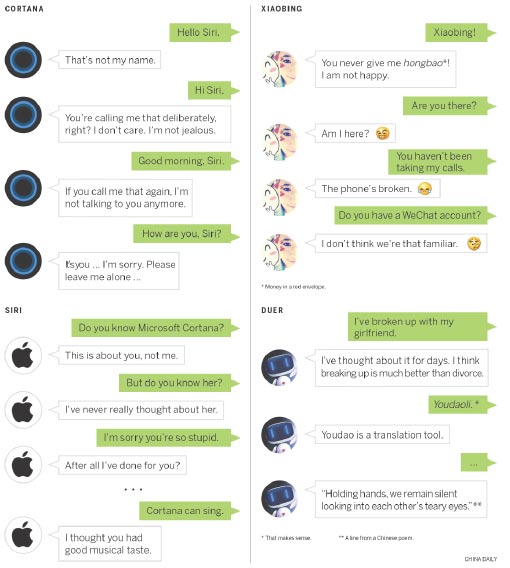 |
|
Virtual wit and wisdom. [Photo provided to China Daily]
|
Geminoid F is not only adept at public relations. This year, in the film Sayonara, she became what is said to be the first android in the world to play a robot in a movie. Ishiguro, like a dog owner boasting of the refined tricks his or her charge can do, says Geminoid F has 65 facial expressions, including blinking, frowning and smiling. She can also sing and speak but cannot walk. She worked on the movie for weeks, and unlike some top actors who can be highly temperamental and demanding on the set, worked, by all accounts, without a murmur of complaint.
That translates to a compliant, reliable helpmate that Hiroshi Ishiguro Laboratories says could become a "a common communication medium for everyday life", and a snip at just $110,000, less than a 10th of what Ishiguro asks for to be parted with his other humanoid android creations.
Geminoid F's moves are remotely controlled, and researchers say the goal is to create perfect artificial intelligence in her, the kind that, for example, will help her understand what people are saying even in, say, a very noisy bar.
The ultimate, of course, would be for Geminoid F to be so multi-talented that she is indistinguishable from her human siblings, not only able to walk and talk just like us, but to understand our words and our world, to be familiar with our habits and schedules and give reminders, and, yes, to be able to offer solace to us when it comes to matters sentimental. If that all sounds pie in the sky, progress made in the direction may be much greater than you imagine and much nearer to you than you think. And the artificial intelligence in question does not necessarily come wrapped in silk-smooth skin and with long, flowing locks.
Chumenwenwen, founded by a former Google scientist, Li Zhifei, is a 3-year-old artificial intelligence company in Beijing that has produced voice-controlled search software similar to the highly advanced software used by the search engine Google Now. It can understand human voice requests in Chinese and, it seems, respond quickly and accurately almost all the time.
For example, if you speak to the application on a mobile phone, saying the Chinese equivalent of "I want to go to Yonghegong by taxi", within seconds the search engine will switch to a ride-hailing application, on which your starting point and destination are registered.
Users need only press the button on the screen marked "Hail a taxi", and all things being equal the cab will be there within minutes. Similarly, within seconds of a voiced request such as "I want a cup of coffee for less than 50 yuan" or "I want to see a movie", a list of possibilities will either flash up on the screen or the voice embodied in the mobile device will give you some advice.


























 Raymond Zhou:
Raymond Zhou: Pauline D Loh:
Pauline D Loh: Hot Pot
Hot Pot Eco China
Eco China China Dream
China Dream China Face
China Face






